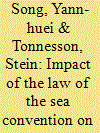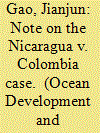| Srl | Item |
| 1 |
ID:
122194


|
|
|
|
|
| Publication |
2013.
|
| Summary/Abstract |
The International Oil Pollution Compensation Fund is a successful international scheme providing supplementary compensation for vessel source oil pollution damage. Some domestic schemes such as the Ship-Source Oil Pollution Fund in Canada and the Oil Spill Liability Trust Fund in the United States have also been successful. China established its Vessel-Source Oil Pollution Compensation Fund in July 2012. This article examines the international and domestic schemes that provide supplementary compensation for vessel source oil pollution and makes some suggestions for amendment of the newly established Chinese national compensation fund.
|
|
|
|
|
|
|
|
|
|
|
|
|
|
|
|
| 2 |
ID:
122193


|
|
|
|
|
| Publication |
2013.
|
| Summary/Abstract |
This article examines the impact of the UN Law of the Sea Convention on conflict behavior and management in the South China Sea during four periods: during its negotiation (1973-1982); from its signing to the entry into force (1982-1994); from then until the China-ASEAN Declaration on the Conduct of Parties in the South China Sea (1995-2002); and from the setting of a timeline for outer limits of continental shelf submissions to the events following the 2009 submissions (2003-2013). Ambiguous effects were found. On the one hand, the Convention has generated or exacerbated conflict by raising the stakes, failing to resolve key legal issues, and encouraging overlapping zone claims. On the other hand, it has provided obligations, language, and techniques for conflict management and resolution. The conflict-enhancing impact was found to have been more substantial than the peace-promoting effects. Nevertheless, the balance has shifted toward more emphasis on conflict management and also some utilization of the Convention's peacemaking potential. If this long-term trend continues and the Convention is more rigorously respected and applied, the Convention may in the end be found to have contributed to regional peace.
|
|
|
|
|
|
|
|
|
|
|
|
|
|
|
|
| 3 |
ID:
122192


|
|
|
|
|
| Publication |
2013.
|
| Summary/Abstract |
The 2012 Nicaragua v. Colombia Case is the second instance where the International Court of Justice has employed the standard method in maritime delimitation since the 2009 Black Sea Case. The "standard method" involves three stages with the construction of a provisional equidistance line as the core of the methodology. There is no legal basis under the UN Convention on the Law of the Sea or customary law for the a priori position given to an equidistance line. Moreover, questions can be raised about the Court's operation at the second stage, which should consist of an adjustment or shifting of the provisional line rather than replacing it. Finally, the use of the disproportionality test as the touchstone for equity of the delimitation line is doubtful.
|
|
|
|
|
|
|
|
|
|
|
|
|
|
|
|
| 4 |
ID:
122195


|
|
|
|
|
| Publication |
2013.
|
| Summary/Abstract |
Mobile offshore drilling units (MODUs) are specialized marine vessels used to drill subsea wells to find and produce hydrocarbons. The contract drilling industry is critical to the offshore oil and gas supply chain, and market dynamics are an important factor in the costs to drill an offshore well. In this article, an introduction to the industry is provided with an emphasis on the factors that influence rig day rates and market structure.
|
|
|
|
|
|
|
|
|
|
|
|
|
|
|
|
| 5 |
ID:
122191


|
|
|
|
|
| Publication |
2013.
|
| Summary/Abstract |
The operation of regional fisheries management organizations (RFMOs) may transform the high seas into mare clausum, by threatening the premise of the freedom of the high seas?equal access of all states to the high seas. This arises since the procedure to become a party to RFMOs prevents states from enjoying the freedom of fishing. Moreover, formal and substantive equality is not ensured in the decision-making process of RFMOs. However, in order to avoid this threat to mare liberum, RFMOs are making some efforts toward more rational and equitable management.
|
|
|
|
|
|
|
|
|
|
|
|
|
|
|
|